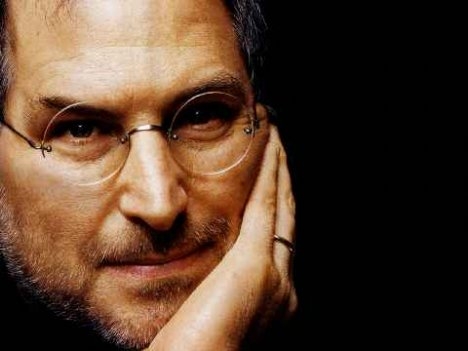The World Reacts to the Passing of an Innovator
 Doug Bernard | Washington DC
Doug Bernard | Washington DC
He was “the leading light” of the digital age. At least, that’s according to one of his fiercest rivals, Sony CEO Howard Stringer. He didn’t just raise the bar, said Twitter CEO Dick Costolo, he created “an entirely new standard of measurement.” His first business partner and long time friend, Steve Wozniak, said simply “He brought a lot of life to the world.”
The passing of Steve Jobs has prompted a global outpouring of condolence and sadness, not just from his fellow tech titans, but among artists, world leaders and, perhaps most profoundly, the millions around the world who have come to think of Apple’s products as something special. “The world has lost a visionary,” said President Obama in a statement shortly after Jobs’ death was announced. “And there may be no greater tribute to Steve’s success than the fact that much of the world learned of his passing on a device he invented.”
Jobs was certainly an inventor – 317 U.S. patents hold his name. But his larger gift was in seeing how the inventions of others could become genuinely useful in people’s lives. For example, Jobs didn’t invent the computer mouse, but he immediately understood how to make it smaller, better and natural to use. The Graphic User Interface – those ‘drop-and-drag’ icons we manipulate on our computer screens? Xerox PARC researchers developed it – but Jobs made it the backbone of Apple products, and an everyday part of our lives. Smart phones? Portable music players? Wireless computing? Jobs true inventiveness wasn’t in being the first to create these things, but in knowing how to integrate them into people’s work and homes seamlessly…all the while, never losing the cool quotient.
“Jobs was not a great human being, but he was a great, transformative, and historical figure,” writes the New Yorker‘s media correspondent Ken Auletta this morning. “Many books were dashed off describing what a tyrannical person Jobs could be—how he took the parking spaces of the handicapped, how he reduced employees to tears. Those tales will fade like yesterday’s newspapers. What will stand erect like an indestructible monument are the things Steve Jobs created that changed our lives.”
No one better knew this day was coming better than Jobs himself. Late this summer he stepped down as Apple CEO, handing the keys over to Tim Cook. For years Jobs had been dogged by rumors of medical issues: he took long periods away from work, his voice grew thin and his body increasingly frail-looking. At his rare public appearances he seemed to be hinting at a fast-approaching future; most notably in his oft-discussed 2005 commencement address at Stanford University. It’s short, just under 15 minutes, and fairly simple: Jobs, who never graduated from college, shares just three stories from his life. But it’s also thick with lessons of perseverance, hope, struggle, and death. Years later, when the world learned of his battle with pancreatic cancer, this line from his commencement took on new gravity: “Remember that you are going to die is the best way I know to avoid the trap of thinking you have something to lose.”
There is no doubt that today’s Apple Corporation is an almost singular expression of Steve Jobs. Always charismatic, he led the company twice: first, at its beginning when the “Apple” and “Apple II” computers were revolutionizing home computing, and later when its many “i-Life” products changed the world again. And while there are plenty of successful CEOs who can mould a unique corporate culture (IBM’s Thomas Watson, NBC’s David Sarnoff, Ford Motor Company’s Henry Ford), few if any had as big a fan base.
Within hours of Job’s passing, at Apple stores in London, Tokyo, New York, San Francisco and elsewhere, people began leaving flowers, lighting candles, or just displaying photos of Jobs on their iPhones or iPads. Apple’s main website – usually filled with pitches for its many products – had just one image, a photo of Steve Jobs with the years of his birth and death. Someone at Apple had labeled the image file simply “hero.”
Across the Internet, fans of Apple products and its mercurial CEO have been sharing their memories, and their loss. On Facebook there are at least a dozen “Goodbye Steve Jobs” pages, and likely more coming each hour. People have begun leaving heartfelt goodbye’s to Jobs on YouTube. On Twitter, the #Jobs’s” tag counts literally millions of tweets (just a few of them collected here by VOA’s Jessica Stahl on Storify) from people offering condolences, remembering their first Apple products, or musing on what happens now for one of the wealthiest and most successful corporations in our time.
Of course, that question – what’s next for Apple? – is one that’s occupying a lot of industry analysts this morning. The recent introduction of their latest product – the iPhone 4s – did not go as smoothly as previous releases, and has been greeted with mixed reviews, including some yawns even from the Apple faithful.
But that discussion is for another day. Today, for those who admired Job’s personal journey, seek to emulate his audacious aesthetic, or who just like Apple’s latest cool device, we remember.
Steve Jobs died Wednesday from a rare form of pancreatic cancer. He was 56 years old.


2 responses to “Goodbye to Steve Jobs”
I am listening to VOA on SW & MW since 1973 ! This is first time I ” found ” you in cyber space – find it more interesting – more thrilling . I must come here again & again . Thank you VOA !
— Ratan Kumar Giri , Evergreen Radio Monitors Club , Sepoy Bazar ,Midnapore – 721101 , West Bengal , India .
So glad you found us! Please come back and let us know what you’re interested in. –db